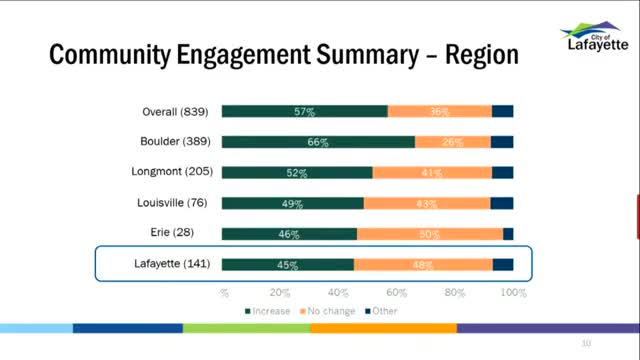Community Divided Over Minimum Wage Increase Proposal
September 03, 2024 | Lafayette, Boulder County, Colorado
This article was created by AI summarizing key points discussed. AI makes mistakes, so for full details and context, please refer to the video of the full meeting. Please report any errors so we can fix them. Report an error »

In a recent government meeting, community sentiment regarding a potential increase in the minimum wage was a focal point of discussion. A survey conducted among Lafayette residents revealed a divided opinion on the matter. Approximately 48% of respondents expressed opposition to any change in the minimum wage, while a smaller percentage showed varying levels of support for increases based on different scenarios.
Specifically, 42% of Lafayette respondents indicated that local elected officials should not alter the minimum wage. Among those in favor of an increase, 13% supported aligning with Denver's minimum wage, while 17% preferred matching Boulder County's staff hourly wage of $23.23. Another 13% favored matching the unincorporated Boulder County minimum wage of $15.69, and 12% provided written responses that were not easily categorized.
The meeting highlighted seven key themes derived from community feedback. First, many respondents believed that an increase in the minimum wage could lead to improved quality of life for earners, enabling them to better afford essential services amid rising living costs. Second, there was a sentiment that businesses might benefit from enhanced employee retention and satisfaction due to higher wages.
However, concerns were also raised about potential inflationary effects, with some respondents fearing that increased wages could lead to higher prices for goods and services. Additionally, business owners expressed worries about wage compression, where an increase in the minimum wage could undermine their competitive pay structures.
Small businesses voiced apprehension that they might be forced to close, lay off staff, or relocate to manage the financial impact of a wage increase. There were also differing opinions on the fundamental purpose of the minimum wage, with some arguing it should not be viewed as a self-sufficiency wage but rather as a training wage.
Finally, some participants contended that it is not the responsibility of local government to raise the minimum wage, suggesting alternative methods for addressing the challenges faced by low-income workers. The discussions reflect a complex landscape of opinions and concerns surrounding the minimum wage issue in Lafayette, indicating that any potential changes will require careful consideration of the diverse perspectives within the community.
Specifically, 42% of Lafayette respondents indicated that local elected officials should not alter the minimum wage. Among those in favor of an increase, 13% supported aligning with Denver's minimum wage, while 17% preferred matching Boulder County's staff hourly wage of $23.23. Another 13% favored matching the unincorporated Boulder County minimum wage of $15.69, and 12% provided written responses that were not easily categorized.
The meeting highlighted seven key themes derived from community feedback. First, many respondents believed that an increase in the minimum wage could lead to improved quality of life for earners, enabling them to better afford essential services amid rising living costs. Second, there was a sentiment that businesses might benefit from enhanced employee retention and satisfaction due to higher wages.
However, concerns were also raised about potential inflationary effects, with some respondents fearing that increased wages could lead to higher prices for goods and services. Additionally, business owners expressed worries about wage compression, where an increase in the minimum wage could undermine their competitive pay structures.
Small businesses voiced apprehension that they might be forced to close, lay off staff, or relocate to manage the financial impact of a wage increase. There were also differing opinions on the fundamental purpose of the minimum wage, with some arguing it should not be viewed as a self-sufficiency wage but rather as a training wage.
Finally, some participants contended that it is not the responsibility of local government to raise the minimum wage, suggesting alternative methods for addressing the challenges faced by low-income workers. The discussions reflect a complex landscape of opinions and concerns surrounding the minimum wage issue in Lafayette, indicating that any potential changes will require careful consideration of the diverse perspectives within the community.
View full meeting
This article is based on a recent meeting—watch the full video and explore the complete transcript for deeper insights into the discussion.
View full meeting
